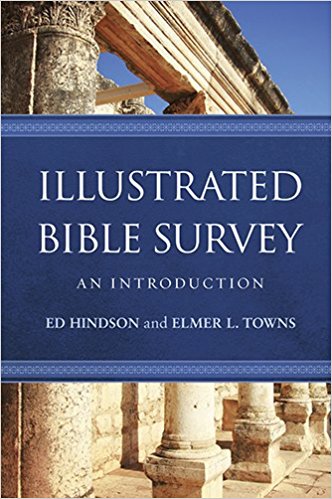By: J. D. Kline | 4/9/18
Ed Hindson and Elmer L. Towns. Illustrated Bible Survey: An Introduction. Revised Edition. Nashville: B&H Academic, 2017. $49.99. 624 pages.
Summary
Hindson and Towns “provide a college-level textbook” that is “ideally suited for undergraduate students, layman and pastors” (see back cover) interested in examining the “authorship, background, message and application” of all sixty-six books of the Bible (Genesis-Revelation) (xi). With this being their purpose for writing, Hindson and Towns brings forth a marvelous study, combining “nearly one hundred years” of teaching experience and a wealth of Biblical knowledge (xi).
Illustrated Bible Survey includes “More than 200 full-color photographs, maps, charts and illustrations” (see back cover) in addition to introductory level treatments of subjects like, “How we Got the Bible” and the important task of “How to Read the Bible” (v). Of course, each chapter closes with a list of helpful resources for further reading and study questions, making this textbook a text to be studied and enjoyed.
While similar to The Essence of the New Testament: A Survey, Illustrated Bible Survey: An Introduction, also includes a survey of the Old Testament making this an unprecedented resource for Biblical studies at this level. Moreover, what I found appealing to this text is how the authors include an introductory chapter on both the Old and New Testaments prior to surveying the actual books, giving background (context) to the purpose and nature of the Bible as a whole. The authors even went so far as to provide an important chapter on, “The History Between the Testaments” (v. see also 331-338). The reason I believe this is essential material for learning goes back to how we are to employ proper and sound hermeneutics; or, how we read and interpret the Bible correctly. Knowing this information really brings the Biblical text to life; allowing us to gain new perspectives to the people and culture in which our faith came, in addition to the Biblical texts historical nature and how God revealed Himself to us throughout salvation history. Having this background in mind guides how we properly interpret the Bible as a whole and as individual sections – considering the historical and grammatical context – in drawing contemporary theological conclusions and doctrine.
I would be remiss not to mention the fact that Illustrated Bible Survey was not only authored by two, very knowledgeable and talented Bible teachers, but also edited and reviewed by some of today’s leading Biblical scholars: John Cartwright, Gabriel Etzel, Ben Gutierrez, James A. Boreland, and Gary Yates (one of my heroes). All in all, there are sixteen Biblical scholars who participated and contributed in the making of this Bible survey. In my opinion, this book, alone, gives one eager learner the information necessary to develop and appreciate a greater understanding of the Bible. In fact, for its level of study, this resource is unprecedented in its class and essential reading for any serious student of the Bible. I highly recommend it!
Strengths/Weaknesses
The strengths of this book is the amount of scholarly participation in putting this book together. Yet, the information contained in this book, while challenging, is simple to follow and understand. In this way, I believe that the authors met their goal of writing “a college-level textbook that is accessible to students and layman alike” (xi).
Biblical scholarship has met its fair share of critics over the past century or more to include the rise and influence of the Jesus Seminar. As a result, the reliability of the Bible and its message is often questioned, even drifting erroneously into liberal waters. Illustrated Bible Survey is an answer to those charges made by liberal scholars – who deny its historicity and undermine its claim as God’s revelation – confidently bringing the Bible back to its evangelical roots. As Hindson and Towns rightly proclaim,
For us the Bible is not merely a combination of ancient documents, historical details, and religious information. It is the living Word of God that still speaks to the minds, hearts, and souls of men and women today. It confronts our sin, exposes our selfishness, examines our motives, challenges our presuppositions, calls us to repentance, asks us to believe its incredible claims, stretches our faith, heals our hurts, blesses our hearts, and soothes our souls (xi, xii).
Benefits
The benefits of this text is the fact survey’s the entire Bible. It challenges the student without information overload and bogging the reader down with technical jargon. As a visual learner who gets distracted rather easily, the books aesthetical appeal (color print, maps, charts, etc) is sure to keep the reader engaged and interested, as it did for me, especially through some of the less appealing topics. Moreover, the illustrations are helpful in bringing the ancient world to the reader; adding depth and perspective to the historical nature of the Biblical narrative.
Rating
I give this book a five star rating and encourage every serious Bible student to buy their copy.
About the Author
 J. D. Kline is a Hospice Clinical Chaplain and a regular contributor of Bellator Christi.com. Jason graduated with a Master of Divinity from Liberty University and received his Certificate in Christian Apologetics from Biola University. He is a full member of the International Society of Christian Apologetics. Jason proudly served his country in the United States Air Force and is a proud husband and father to his wife and three children. His current research involves the soul and how a sound theology of the soul influences the counseling process.
J. D. Kline is a Hospice Clinical Chaplain and a regular contributor of Bellator Christi.com. Jason graduated with a Master of Divinity from Liberty University and received his Certificate in Christian Apologetics from Biola University. He is a full member of the International Society of Christian Apologetics. Jason proudly served his country in the United States Air Force and is a proud husband and father to his wife and three children. His current research involves the soul and how a sound theology of the soul influences the counseling process.
© 2018. BellatorChristi.com.





